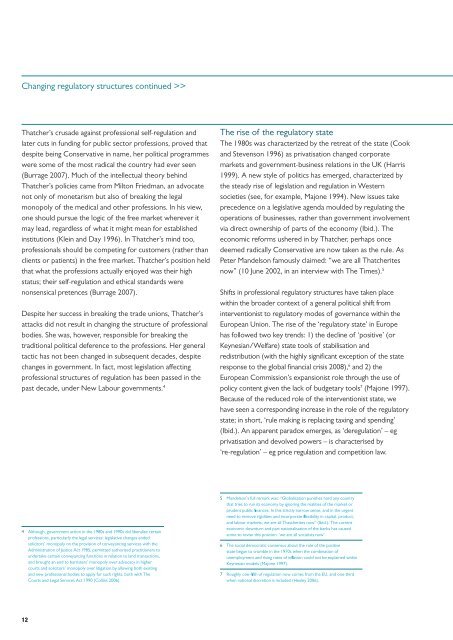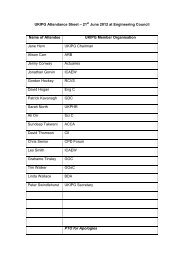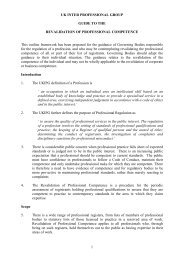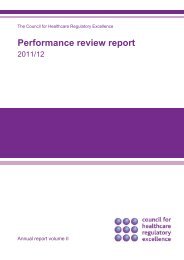BRITISH PROFESSIONS TODAY: THE STATE OF ... - Property Week
BRITISH PROFESSIONS TODAY: THE STATE OF ... - Property Week
BRITISH PROFESSIONS TODAY: THE STATE OF ... - Property Week
You also want an ePaper? Increase the reach of your titles
YUMPU automatically turns print PDFs into web optimized ePapers that Google loves.
Changing regulatory structures continued >><br />
Thatcher’s crusade against professional self-regulation and<br />
later cuts in funding for public sector professions, proved that<br />
despite being Conservative in name, her political programmes<br />
were some of the most radical the country had ever seen<br />
(Burrage 2007). Much of the intellectual theory behind<br />
Thatcher’s policies came from Milton Friedman, an advocate<br />
not only of monetarism but also of breaking the legal<br />
monopoly of the medical and other professions. In his view,<br />
one should pursue the logic of the free market wherever it<br />
may lead, regardless of what it might mean for established<br />
institutions (Klein and Day 1996). In Thatcher’s mind too,<br />
professionals should be competing for customers (rather than<br />
clients or patients) in the free market. Thatcher’s position held<br />
that what the professions actually enjoyed was their high<br />
status; their self-regulation and ethical standards were<br />
nonsensical pretences (Burrage 2007).<br />
Despite her success in breaking the trade unions, Thatcher’s<br />
attacks did not result in changing the structure of professional<br />
bodies. She was, however, responsible for breaking the<br />
traditional political deference to the professions. Her general<br />
tactic has not been changed in subsequent decades, despite<br />
changes in government. In fact, most legislation affecting<br />
professional structures of regulation has been passed in the<br />
past decade, under New Labour governments. 4<br />
The rise of the regulatory state<br />
The 1980s was characterized by the retreat of the state (Cook<br />
and Stevenson 1996) as privatisation changed corporate<br />
markets and government-business relations in the UK (Harris<br />
1999). A new style of politics has emerged, characterized by<br />
the steady rise of legislation and regulation in Western<br />
societies (see, for example, Majone 1994). New issues take<br />
precedence on a legislative agenda moulded by regulating the<br />
operations of businesses, rather than government involvement<br />
via direct ownership of parts of the economy (Ibid.). The<br />
economic reforms ushered in by Thatcher, perhaps once<br />
deemed radically Conservative are now taken as the rule. As<br />
Peter Mandelson famously claimed: “we are all Thatcherites<br />
now” (10 June 2002, in an interview with The Times). 5<br />
Shifts in professional regulatory structures have taken place<br />
within the broader context of a general political shift from<br />
interventionist to regulatory modes of governance within the<br />
European Union. The rise of the ‘regulatory state’ in Europe<br />
has followed two key trends: 1) the decline of ‘positive’ (or<br />
Keynesian/Welfare) state tools of stabilisation and<br />
redistribution (with the highly significant exception of the state<br />
response to the global financial crisis 2008), 6 and 2) the<br />
European Commission’s expansionist role through the use of<br />
policy content given the lack of budgetary tools 7 (Majone 1997).<br />
Because of the reduced role of the interventionist state, we<br />
have seen a corresponding increase in the role of the regulatory<br />
state; in short, ‘rule making is replacing taxing and spending’<br />
(Ibid.). An apparent paradox emerges, as ‘deregulation’ – eg<br />
privatisation and devolved powers – is characterised by<br />
‘re-regulation’ – eg price regulation and competition law.<br />
4 Although, government action in the 1980s and 1990s did liberalise certain<br />
professions, particularly the legal services: legislative changes ended<br />
solicitors’ monopoly on the provision of conveyancing services with the<br />
Administration of Justice Act 1985, permitted authorised practitioners to<br />
undertake certain conveyancing functions in relation to land transactions,<br />
and brought an end to barristers’ monopoly over advocacy in higher<br />
courts and solicitors’ monopoly over litigation by allowing both existing<br />
and new professional bodies to apply for such rights, both with The<br />
Courts and Legal Services Act 1990 (Collins 2006).<br />
5 Mandelson’s full remark was: “Globalisation punishes hard any country<br />
that tries to run its economy by ignoring the realities of the market or<br />
prudent public fi nances. In this strictly narrow sense, and in the urgent<br />
need to remove rigidities and incorporate fl exibility in capital, product,<br />
and labour markets, we are all Thatcherites now” (Ibid.). The current<br />
economic downturn and part nationalisation of the banks has caused<br />
some to revise this position: ‘we are all socialists now’.<br />
6 The social democratic consensus about the role of the positive<br />
state began to crumble in the 1970s when the combination of<br />
unemployment and rising rates of infl ation could not be explained within<br />
Keynesian models (Majone 1997).<br />
7 Roughly one-fi fth of regulation now comes from the EU, and one-third<br />
when national discretion is included (Healey 2006).<br />
12










